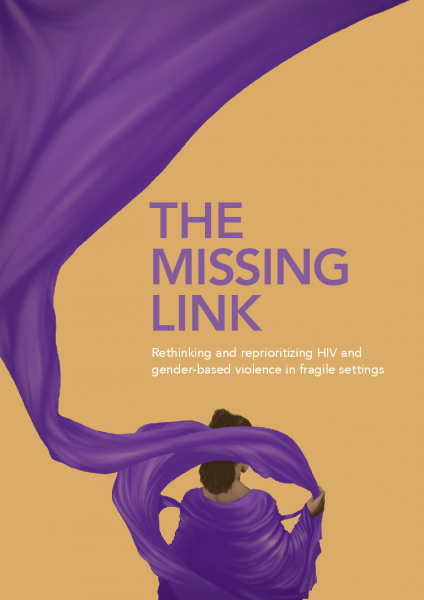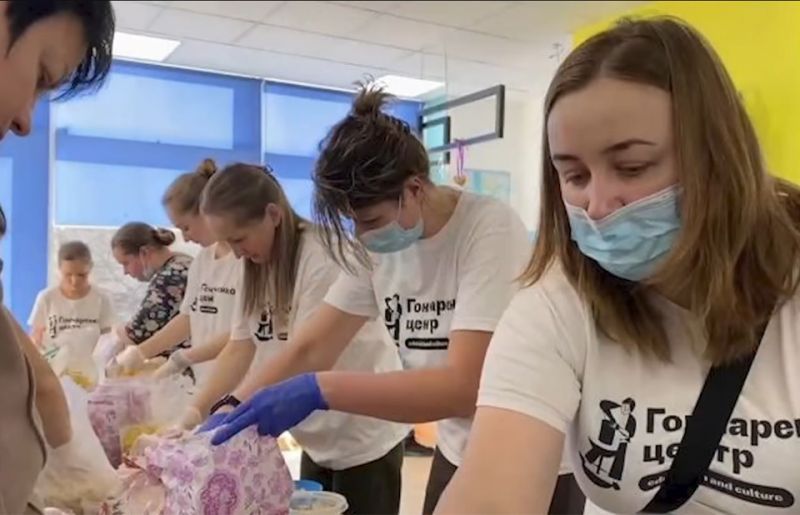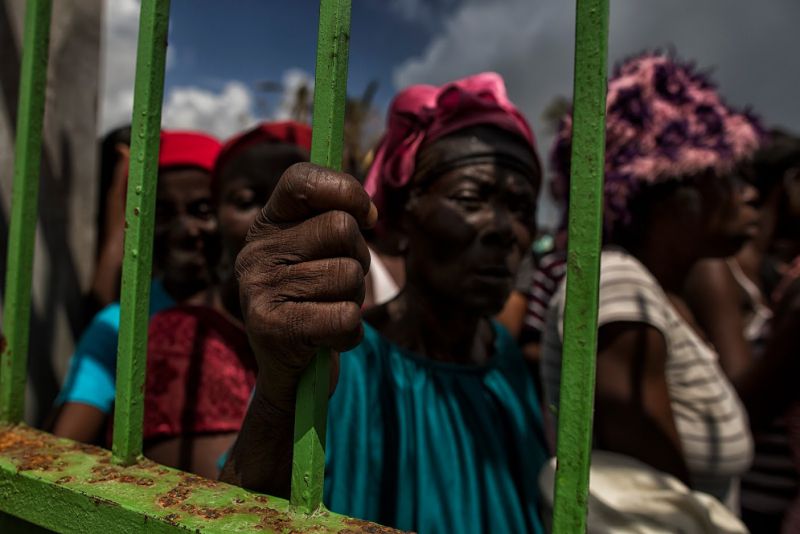Urgent call issued for a dramatic upscaling of international support for the heroic efforts of civil society-led networks to reach people with life-saving HIV treatment
GENEVA, 13 April 2022—The war in Ukraine has resulted in the destruction and disruption of health services and logistical supply chains that hundreds of thousands of people living with and affected by HIV depend on for survival. More than a quarter of a million Ukrainians are living with HIV, and lack of access to antiretroviral therapy and prevention services would mean a wave of deaths and risks a resurgence of Ukraine’s AIDS pandemic. The community-led networks which are vital to maintaining life-saving services need an urgent upscaling of international support.
More than 40 health facilities that offered HIV treatment, prevention and care services before the war are now closed and there are various levels of service disruption at other sites. By 11 April, the World Health Organization (WHO) had verified more than 100 attacks on health facilities in Ukraine, while supply routes within the country have been thrown into disarray. The United Nations Children’s Fund reports that attacks on water system infrastructure and power outages have left an estimated 1.4 million people without access to water, while another 4.6 million have only limited access. Meanwhile, the World Bank has said it expects Ukraine’s economy to shrink by 45% this year, posing a dire threat to the maintenance of vital health and social programmes.
An initial delivery of more than 18 million doses of life-saving antiretroviral medicine procured by the United States President’s Emergency Plan for AIDS Relief (PEPFAR) that arrived in Lviv last week is now being distributed in partnership with the Public Health Center of the Ministry of Health of Ukraine and 100% Life, the largest organization of people living with HIV in Ukraine. If they can be delivered to those in need, the medicines are sufficient to cover a six-month supply for all people living with HIV on first-line treatment. This first tranche is part of PEPFAR’s commitment to fund 12-month HIV treatment needs in Ukraine. UNAIDS estimates that 260 000 people were living with HIV in Ukraine before the war broke out, 152 000 of whom were taking daily medication for HIV.
The Global Fund to Fight AIDS, Tuberculosis and Malaria (Global Fund) is also providing emergency funding to ensure the continuity of life-saving HIV and tuberculosis services.
Attention is now on ensuring that the life-saving HIV medicines reach all people in need in time. Civil society organizations are mounting a heroic effort to deliver vital medical supplies and HIV services to people living with and affected by HIV, including to vulnerable populations. They are reaching people in extraordinary challenging locations, despite the huge obstacles. But the civil society organizations on which this delivery and care system depends need further international support to be able to continue their work.
“The situation for people living with HIV in Ukraine is desperate. We are trying to deliver medicines, food and other emergency assistance to people in need, but the work is dangerous and volunteers are putting their lives at risk,” said Dmytro Sherembey, Head of the 100% Life Coordination Council. “If we don’t get more help, I am not sure how much longer we can continue, especially reaching people in the front-line zones.”
UNAIDS, which has released an initial US$ 200 000 in emergency funds to address urgent humanitarian and programme demands in seven cities that have large HIV epidemics (Chernihiv, Dnipro, Kharkiv, Kryvy Rih, Kyiv, Odesa and Poltava), has issued an urgent call to the international community for an additional US$ 2.42 million for civil society organizations providing HIV services in Ukraine and for those receiving refugees affected by HIV in other countries, as part of the wider upscaling needed.
“Civil society organizations and communities of people living with and affected by HIV are the bedrock of the HIV response in Ukraine,” said Winnie Byanyima, Executive Director of UNAIDS. “They urgently require additional financial and logistical support to ensure the continuity of HIV treatment, care and prevention programmes. We urge all donors to be part of enabling this vital service to save lives and prevent a resurgence of the AIDS pandemic in Ukraine.”
It is only because Ukraine’s pioneering response to HIV has been a partnership between public and community-led provision that it has been able to continue to provide for people even through the horrors of war. But the civil society networks, on whose creativity and courage the HIV services depend, require a boost in international support to ensure continued operations at the level required.
Getting medical supplies and services to vulnerable groups of people remains extremely challenging and UNAIDS is working with humanitarian partners in Ukraine and internationally to advance urgent solutions to provide medical and humanitarian support to hundreds of thousands of Ukrainians.
The Alliance for Public Health is working to provide the emergency support needed during the conflict, using minibuses to meet pressing humanitarian needs, including the evacuation of vulnerable populations and the delivery of food and medicines. Communities on the front line of the response are making exceptional efforts to reach people. For example, mobile clinics have been deployed by the Alliance for Public Health to take opioid substitution therapy to people who use drugs in areas where facilities have been forced to close. UNAIDS is also working with the Global Fund and with a UNAIDS Cosponsor, the United Nations Office on Drugs and Crime, to obtain additional supplies of opioid substitution therapy.
The conflict has forced millions of Ukrainians to leave the country and thousands of Ukrainian women and children living with HIV are in need of support in host countries. Civil society networks supported by UNAIDS Cosponsors and partners are helping refugees access antiretroviral therapy in the Republic of Moldova and across the European Union.
WHO has helped to broker a deal with the pharmaceutical company ViiV Healthcare to provide donations of HIV medicines to Czechia, Poland and other European Union countries receiving large numbers of Ukrainian refugees.
UNAIDS is also urging the international community to help refugee accommodation centres strengthen their support for people facing the highest risks, by expanding psychosocial services, HIV treatment and prevention services, and services related to gender-based violence. A UNAIDS Cosponsor, UN Women, has said that reports of sexual abuse and human trafficking in Ukraine indicate a protection crisis. UNAIDS has warned of increased risks for lesbian, gay, bisexual, transgender and intersex people.
Ms Byanyima reaffirmed the United Nation’s call for an end to the war. “The biggest need is for peace”, said Ms Byanyima. “The war in Ukraine must stop—now. Recovery requires an end to this war. And even when it ends there will be so much help needed. Ukrainians living with HIV have been put in grave danger by this war. The civil society-led responder networks for HIV services who risk their lives to save lives need every possible support.”
HIV hotline number in Ukraine: 0800 500 451.
More support for Ukrainian refugees living with HIV can be found on the ART Initiative for Ukrainians Abroad website, which was established in coordination with Ukraine’s Public Health Center. More precise data on the whereabouts and needs of people living with HIV in Ukraine and those forced to flee the country are being collected.
UNAIDS
The Joint United Nations Programme on HIV/AIDS (UNAIDS) leads and inspires the world to achieve its shared vision of zero new HIV infections, zero discrimination and zero AIDS-related deaths. UNAIDS unites the efforts of 11 UN organizations—UNHCR, UNICEF, WFP, UNDP, UNFPA, UNODC, UN Women, ILO, UNESCO, WHO and the World Bank—and works closely with global and national partners towards ending the AIDS epidemic by 2030 as part of the Sustainable Development Goals. Learn more at unaids.org and connect with us on Facebook, Twitter, Instagram and YouTube.








